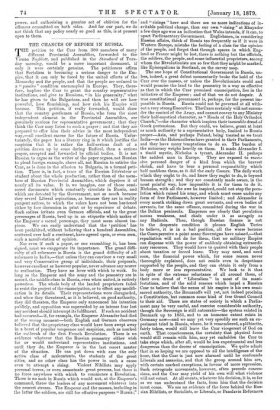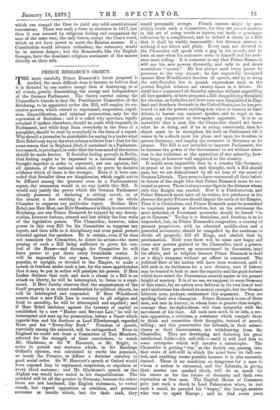THE CHANCES OF REFORM IN RUSSIA.
THE petition to the Czar from 300 members of many different Provincial Assemblies, forwarded to the Vienna Tagblatt, and published in the Standard of Tues- day morning, would be a more important document, if only it were certainly genuine. The petitioners affirm that Socialism is becoming a serious danger to the Em- pire, that it can only be faced by the united efforts of the Monarchy and the people, and that the people are reduced to a " passive " condition unexampled in Europe. They, there- fore, implore the Czar to grant the country representative institutions, and give to Russians, "in his generosity," what he has given to the Bulgarians, and then he will see how powerful, how flourishing, and how rich his Empire will become. This petition, if really forwarded, would show that the country gentlemen of Russia, who form the Most independent element in the Provincial Assemblies, are genuinely anxious for representative government ; that they think the Czar may listen to such a prayer ; and that they are prepared to offer him their advice in the most independent way,—all excellent omens for the future of Russia. Unfor- tunately, the paper has a literary ring in it which justifies the suspicion that it is rather the half-serious draft of a petition drawn up by some daring Radical, than a serious prayer, accepted and forwarded by official bodies. It is not Russian to argue as the writer of the paper argues, not Russian to plead foreign example, above all, not Russian to satirise the Czar, as is done in the allusion to Bulgaria, in a formal peti- tion. There is, in fact, a trace of the Russian litterateur or student about the whole production, rather than of the mem- bers of Russian Provincial Assemblies, which deprives it of nearly all its value. It is, we imagine, one of those semi- secret documents which constantly circulate in Russia, and which are detested by the Government, not so much because they reveal Liberal aspirations, as because they are in reality pungent satires, to which the rulers have not been hardened either by free discussion in print or by experience of debate. Such satires irritate even German officials, and to the great personages of Russia, bred up in an etiquette which makes of the Emperor a sacred personage, they must seem almost im- pious. We can easily understand that the petition' has been prohibited, without believing that a hundred Assemblies, scattered over half a continent, have agreed upon, or even seen, such a manifestation of opinion.
Nor even if such a paper, or one resembling it, has been signed, must we exaggerate its importance. The grand diffi- culty of all reformers in Russia is the grand difficulty of all reformers in India,—that unless they can convince a very small and very Conservative group of individuals, their proposals, however excellent or however popular, never advance any nearer to realisation. They have no lever with which to work. So long as the Emperor and the army and the peasantry are in accord, the middle-class in Russia, even when united, is entirely powerless. The whole body of the landed proprietors failed to resist the project of the emancipation, or to effect any modifi- cation in its details. Their representations were disregarded, and when they threatened, as it is believed, on good authority, they did threaten, the Emperor only announced his intention publicly, and opposition was superseded by an intense fear lest any accident should interrupt its fulfilment. If such an accident' had occurred—if, for example, the Emperor Alexander had died at the wrong moment—both English and German observers believed that the proprietary class would have been swept away in a burst of popular vengeance and suspicion, such as marked the outbreak of the first French Revolution. There is no evidence whatever that the Russian peasantry either wish for or would understand representative institutions, and until they do, the Emperor is in the last resort master of the situation. He can put down with ease the only active class of malcontents, the students of the great cities, and no other class has the power in such a cause even to attempt a rising. Violent Nihilists may apply personal terror, or even assassinate great persons, but there is no force anywhere with which to commence a Revolution. There is no mob in Russia which would not, at the Emperor's command, throw the leaders of any movement whatever into the nearest stream. The Emperor and the masses, including in the latter the soldiers, are still for effective purposes " Russia ;." and " risings " here and there are no more indications of in- evitable political change, than our own " rising " at Rhayader a few days ago was an indication that Wales intends, if it can, to upset Parliamentary Government. Englishmen, in considering Russian affairs, think of Russia too frequently as- if it were in Western Europe, mistake the feeling of a class -for the opinion of the people, and forget that through spaces in which Eng- land or France might be lost, there is nothing but the officials, the soldiers, the people, and some influential proprietors, among whom the Revolutionists are so few that they mightbe marked, like Episcopalians in Scotland, on the survey map. The one hope of Constitutional Government in Russia, un- less, indeed, a great defeat momentarily broke the hold of the Czar over the masses, or unless the Revolutionists could and would promise the land to the peasantry in a way as effective as that in which the Czar promised emancipation, lies in the initiative of the Emperor ; and of that we do not despair. A true constitutional government is, perhaps, for the present im- possible in Russia. Russia could not be governed at all with- out a very strong Executive. The Czars certainly will not surren- der the control of the Army, and cannot convey to any Ministry their half-mystical character, as " Heads of the Holy Orthodox Church,"—the character which inspires their incurable dread of Greek pretensions. But they could, we believe, grant at least as much authority to a representative body, limited to Russia proper—Asia, and perhaps Poland, being treated as we treat India—as the Hohenzollerns have granted to their Parliaments, and they have many temptations •to do so. The burden of the autocracy weighs heavily on. them. It made Alexander I. a timid mystic, Nicholas a tyrant, Alexander II. perhaps the saddest man in Europe. They are exposed to exces- sive personal danger of a kind from which the bravest shrink, and have to bear a personal responsibility which half maddens them, as it did the early Camara. The -daily work which they ought to do, and know they ought to do, is beyond human strength ; and they are constantly made aware, in the most painful way, how impossible it is for them to do it. Nicholas, with all the awe he inspired, could not stop the pecu- lation which ruined his army, and which must cease under any form of free Parliament, however limited ; and Alexander is every month striking down great servants, and even bodies of servants, for the same offence, committed during the war in the Balkan peninsula. Emperors see clearly that peculation means weakness, and chafe under it as savagely as any Radicals. Then, though Russian finance is not in the desperate condition it pleases English Tories to believe, it is in a bad position, all the worse because the Czars perceive a point many Sovereigns have missed,—that repudiation will not do for them, that no military Empire can dispense with the power of suddenly obtaining extraordi- nary resources. They would have to quarrel with their people about taxation or forced loans. They may need, and need soon, the financial power which, for some reason never thoroughly explained, does not reside even in despotisms supported by the people, and they can obtain it only from a body more or less representative. We look to it that in spite of the extreme reluctance of all around them, of their own dread of " Liberalism " in most of its mani- festations, and of the solid reasons which impel a Russian Czar to believe that the nexus of his empire is his own semi- sacred authority, the Romanoffs will yet, not indeed proclaim a Constitution, but summon some kind of free Grand Council to their aid. There are states of society in which a Parlia- ment may be very useful, and exercise considerable authority, though the Sovereign is still autocratic—the system existed in Denmark up to 1831, and to an immense extent exists in Germany now—and we may yet very speedily see such an ex- periment tried in Russia, where, be it remembered, aplebiscite, fairly taken, would still leave the Czar vicegerent of God on earth. That consciousness, the certainty that physical force would still remain with him, may yet embolden the Czar to take steps which, after all, would be less experimental and less dangerous than the decree of emancipation. We quite admit that in so hoping we are opposed to all the intelligence of the hour, that the Czar is just now alarmed until he confounds Liberals and assassins, and that the group around him are, with certain marked exceptions, in favour of more repression. Such retrograde movements, however, often precede conces- sions, and the Czar may yield of his own will what violence will not extort. At all events, whatever his decision, it is, so far as we can understand the facts, from him that the decision must come. We see no evidence of the force behind the Rus- sian Nihilists, or Socialists, or Liberals, or Panslavic Reformers which can compel the Czar to yield any solid constitutional concessions. There was such a force in existence in 1877, but then it was aroused by religious feeling and compassion for men of the same race, the only forces, except the Czar's word, which as yet have power to move the Russian masses. If a Constitution would advance orthodoxy, the autocracy would be in serious danger ; but the Romanoffs, like the English Georges, have the dominant religious sentiment of the masses directly on their side.



































 Previous page
Previous page